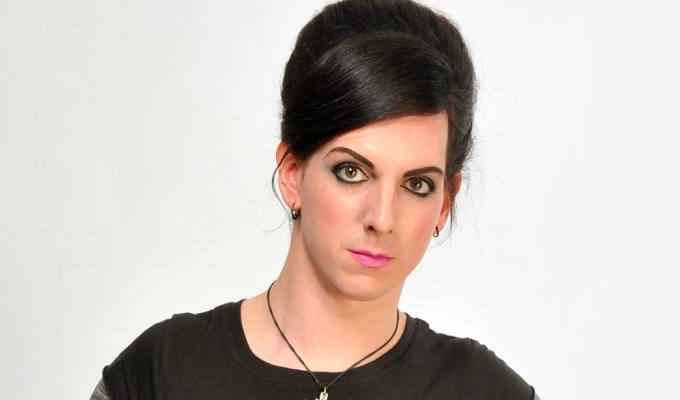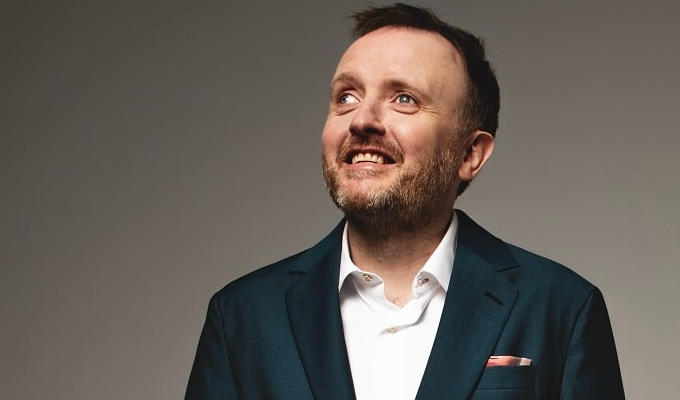 © Christopher William Adach/CC BY-SA 2.0
© Christopher William Adach/CC BY-SA 2.0 Why Charlie Higson was drawn to animation
...as he scoops an award for his Boris Karloff short
 When Plymouth College of Art ran a competition for members of the public to make a 60-second film about horror icon Boris Karloff, they probably didn’t expect the creator of a Bafta-winning comedy show to enter.
When Plymouth College of Art ran a competition for members of the public to make a 60-second film about horror icon Boris Karloff, they probably didn’t expect the creator of a Bafta-winning comedy show to enter.
And although it might seem tough on the amateur entrants, Charlie Higson’s contribution has just been was declared the winner.
However, the film did represent something new for the Fast Show star and producer, since it was his first animation – a skill he’s been learning during lockdown.
He said he first dabbled in the art after being invited to revive his sleazy car dealer Swiss Toni for the BBC’s Comedians: Home Alone series , but couldn’t hope to recreate the character’s distinctive look on his own.
He explained: ‘We’d all just gone into lockdown and no-one knew how long it was going to last. People thought it was the chance to learn a new language or write their next novel, but it turns out the underlying anxiety of a pandemic makes it quite hard to concentrate!
‘I found it the same, and since I wasn’t able to do any of my TV projects, I found it easier to focus on smaller projects.
‘During this time, I was approached by a TV producer who asked me if I was interested in a show about comedians during lockdown. She asked if I’d like to do a sketch of Swiss Toni, zooming his assistant Paul, for example. I said I could write it, but without the suit, hair, wig and makeup, I don’t look anything like Swiss Toni! I rather rashly solved that problem by suggesting an animation, and she said, oh brilliant, yeah!
‘So I had my iPad, my Apple Pencil and Procreate and began generating frame by frame artwork for the Swiss Toni sketch. I would download images of Swiss Toni and use a rotoscope technique to trace them, then apply different mouth shape animations to his head. It was this method I used for the Boris Karloff short.
‘It took me months! Despite the fact I’m using quite a simple technique, it’s easy to forget how many frames you’ll need per second and how many drawings you’ll actually have to generate. In reality, I was creating artwork for weeks, but it was a very welcome distraction to lockdown. It was a great project to do.’
Charlie’s film features some of Karloff’s most memorable characters incluidng Imhotep in The Mummy (1932), undead Egyptologist Professor Henry Morlant in The Ghoul (1933), and the resurrected, wrongly accused chatacter of John Ellman in The Walking Dead (1936). And, of course, Frankenstein’s Monster (1931)
Higson, who has also written the Young Bond books and the post-apocalyptic Enemy series of zombie-horror books, added: ‘Boris Karloff was in the centre of the huge explosion of horror films in the 1930s, and his portrayal of Frankenstein's monster is stunning.
‘The theme of coming back to life, living beyond the grave, is something that Karloff never escaped from. So many of his films revolved around the idea of someone coming back to life. I took the starting point of Frankenstein because if you’re going to do anything about Karloff, it’s impossible to escape that. It was when I was resurrecting him again for my animation, that I found myself thinking, through the medium of film, Karloff truly did become immortal. Every time we watch his films now, he is brought back to life.
‘Film has always fascinated me, it’s such a bizarre idea that you’re essentially flashing lights onto a wall, but there is a living breathing person there. There’s a story you get involved with and the actors, who are long dead, dead for decades in some cases, they’re there! In front of you! We’re so used to it, we accept it without thinking. I do think that’s such a fascinating idea, and I tried to put that into a one-minute animation!"
‘I really love Boris Karloff, but I’m into the whole history of horror really. After writing The Enemy, I ended up developing quite a long talk about horror, going through the origins from Mary Shelley right through 19th century gothic horror and into the 20th century and how that all comes together now.
‘Film is such a great medium for exploring the fantastical and horror has been at the centre of cinema right from the start. Horror is a great way to look at those very heavy concerns like death, disease, loss, aging, but with that fantasy filter. It becomes that classic safe scare where you can induce some extremely powerful emotions; fear, dread, disgust, grief, and can help you process real world issues.’
Judges for the Plymouth competition said Higson’s film – which will now be shown during their Boris Karloff Symposium at Halloween, ’showed imagination and technical skill’.
But the comedian and writer said that the tools needed to make such films are now in everybody’s hands.
‘You can make feature films shot on an iPhone,’ he said. ‘And people have. To any aspiring creative, I would say you have the power to do it yourself. It’s in your hands, make stuff, do stuff! Ultimately, the traditional ways of making money are still the ways to make the most money, but there are ways of learning and doing things that get that within your grasp.
‘People always say to me, "I want to get on TV and make a comedy show!" I normally say, "well so do I!"
‘Yes, it’s easier for me, but there is no secret back door that I can go through and they’ll give me the money to make a TV show. There’s no magic route, other than learn as much as you can.
‘The way the world is going, it’s more important than ever to be open to new technologies and new ways of working. I’ve only really been able to survive as a writer by switching it up and doing other things. It’s no bad thing to keep reinventing yourself and being excited about what you’re doing. As with all our jobs, the idea of doing one thing and sticking at that forever has gone out the window.
‘You tend to see the people that do well are the people who are prepared to put the work in and make contacts, and that’s what university and college has been for years.
‘It was through university that I ended up in my first band with Paul Whitehouse. Look at what other people do, work out how they do it. Get as much life experience as you can.
‘That’s another thing I always say to students, is get a life. Paul and I were in our late 20s when we started getting into comedy and were in our mid 30s when we made The Fast Show. We’d had a lot of other experiences, we’d gone out and met people, we’d worked in different situations and we had some experience of the world. We had more to write about.
‘Students don’t need to panic, you bring a lot more to the table if you’ve gone out and lived a bit. Keep an open mind and get out there.’
Published: 27 Apr 2021






